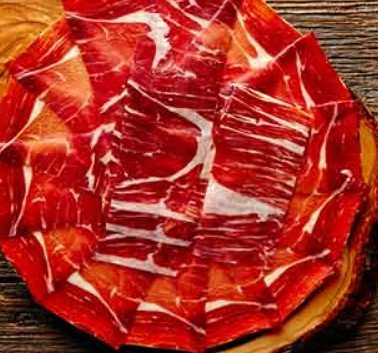Does Serrano Ham Have Nitrates?
Serrano ham is Spain’s dry-cured meat with a dry texture and rich flavor emphasized by the preservatives from the curing process.
The most common nitrate found in serrano ham is nitrogen, which is added to improve the flavor.
While it can be fatal in high doses, it is not lethal, and people who are allergic to it will still experience symptoms such as wheezing, shortness of breath, and/or coughing.
Other nitrates that are found in serrano ham include Sodium nitrite, Potassium nitrate, and Sodium nitrate.
Serrano ham does not have nitrates since curing salts usually contain nitrates. Continue reading if you are looking for the answer to the question.
This article will tell you everything you need to know about Serrano ham, and why it would be wrong to call it nitrate-free.
Table of Contents
Does Serrano Ham Have Any Nitrates?
Cured hams can be covered in salt for up to 30 days, which is a natural source of nitrates. The process for Serrano ham takes about fifteen days.
Serrano ham can absorb nitrates from the salt.
Cured meat with nitrates and nitrites is necessary.
During the salting phase, sodium nitrite is added to meat products to prevent the growth of harmful bacteria and help the meat last longer.
It ensures that cured meat is rich in flavor and gives it its signature pink hue. We get less than 5% of our daily sodium nitrate intake from cured meats.
Most of it comes from leafy vegetables like spinach and rocket, which naturally have higher levels of sodium nitrite.
Pork and salt are the only ingredients used in the traditional way of making Serrano ham. Preservatives can be used if the manufacturer chooses to do so.
Adding nitrates to the ham will stop it from getting spoiled and give it a more attractive pink color.
While recent research has linked nitrates in food to potentially cancer-inducing effects, whether they are bad or good for us depends on how and where the food is processed.
Frying or cooking meats like bacon and hot dogs at high temperatures can turn nitrates into nitrosamines, which are generally considered to be bad for you.
Serrano ham has a lower nitrosamines build-up compared to products that require cooking over an open flame, fried and smoked meats.
European authorities regulate its nitrates levels and they add up to 150 parts per million, which is the amount needed to combat the spread of microbes.
Is Serrano Ham Considered a Processed Meat?
Any meat that is not fresh is considered to be processed. Cured meats are usually treated with salt, sugar, and preservatives.
This also includes bacon, bologna, Serrano ham, and more. Some manufacturers are starting to use natural nitrate sources such as celery salt.
Some of these products have been marketed as uncured. The same thing can be done with celery salt, extending the shelf life of the product.
Let’s look at how Serrano ham is produced to determine if it qualifies as processed meat.
Serrano ham can be taken from any Spanish pig, except for black Iberian pigs, which are exclusively used to make Iberico ham.
It can take anywhere from six to 18 months for the dry-curing process to end. The meat is salted and then left to rest for a period of up to 10 days.
It should be kept in a room with a temperature of 37 degrees. After washing the ham, it’s time to get rid of the salt.
The meat should be kept out of the cold for at least one to two months in a drying room. It takes six to 12 months for the curing phase to start.
The ham hangs from the ceiling during this time to lose water and get rich flavors.
Depending on the climate and the size of the meat cuts, the curing can be extended for 18 months.
Since processed meat is any treated meat product, salted, cured, canned, or dried fall under this category.
Serrano ham is dry-cured with salt, and manufacturers can choose whether or not to sprinkle in enhancers.
It’s also a kind of meat that has been processed. Some confusion can be created by the use of sodium nitrate and celery powder.
When people ask if Serrano ham is processed, they usually want to know if it has been cured, salted, and loaded with Additives.
Serrano ham is a processed meat product and whether it is natural or synthetic doesn’t make a huge difference.
Is Serrano Ham Good for Your Helth?
Serrano ham doesn’t have a low nutrition value because it isn’t processed. Serrano ham is an excellent source of minerals and is a great way to balance your diet.
Pork is a good source of animal proteins that our bodies can’t create on their own. Oleic acid helps regulate the concentration of bad cholesterol in the body.
Other types of red meat, like beef, can cause cholesterol issues and increase the risk of cardiovascular disease if you consume too much of them.
Serrano ham has more than half of the fats found in it being unsaturated and helping to protect the heart.
Serrano ham is better for you than meats such as bacon, sausages, or pancetta. The B-complex vitamins in the meat allow our metabolism to function correctly.
The B1, B3, and B6 vitamins encourage the production of red blood cells, as well as engender good skin health and DNA repair.
The curing process of ham makes the meat easy to digest. The meat doesn’t strain our bicycle, so we can break it down and use it for other purposes.
Bayonne ham and Prosciutto di Parma are examples of cured meats that spend more time in the salt.
This results in higher levels of nitrosamines, which are considered strong carcinogens.
Serrano ham is covered in salt for up to 10 days so there is less nitrosamine accumulating.
Compared to other cold slices and red meat products, Serrano ham is a good addition to a balanced and healthy diet.
Are There Any Hams Without Nitrates?
Many manufacturers have started labeling their products as “nitrate-free.” This is due to the research into nitrates’ negative impact on health.
Is it possible that there is a ham without nitrates? Meat manufacturers use fresh celery to extract large quantities of salt instead of using synthetic nitrates.
The meat is juiced or ground up and then treated with an extract during the curing process.
The pork is made from natural ingredients, such as vegetables, and still contains nitrates.
Uncured meat contains about the same amount of nitrates as traditionally cured meat, which is why packaging with words like “no nitrates” or “Uncured” can be misleading.
It would pose some health risks if nitrates were removed from the food.
They help the meat last longer by preventing the development of toxins that cause botulism.
Here are some popular options of meat without sodium nitrate:
- Prosciutto di Parma
- Finocchiona
- Capocollo
Conclusion
Serrano ham is a part of Spanish cuisine and enjoys worldwide popularity. The ham goes through an extensive curing process to give it its pink color.
The finished product contains nitrates, whether the salt is sodium nitrite or not.
Serrano ham has many vitamins and minerals that promote the health of our metabolism, unlike a high nitrate intake that can cause harm to our bodies.
Serrano ham won’t endanger your health and wellness goals if you treat yourself to a serving.
When taken in moderation, the nitrates will not do you any harm and you will experience the full benefits of the ham.

Foodie and a passionate cook, I am here to share all of what I know about cooking, kitchen, and food prepping.
Follow me for delicious and healthy recipes.







